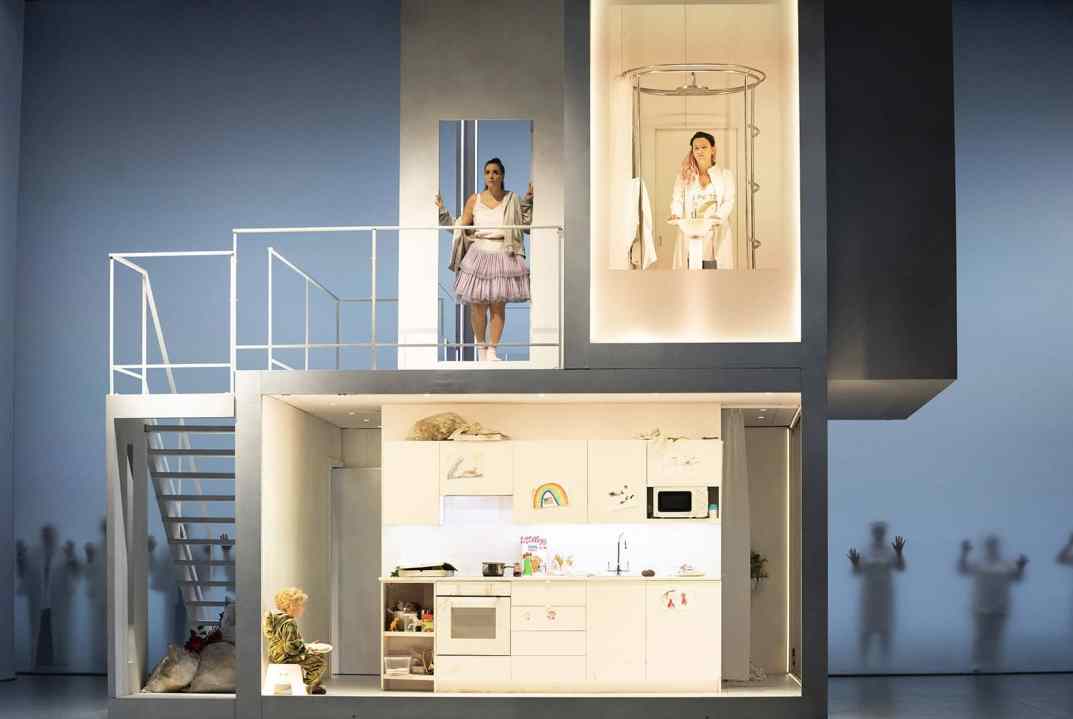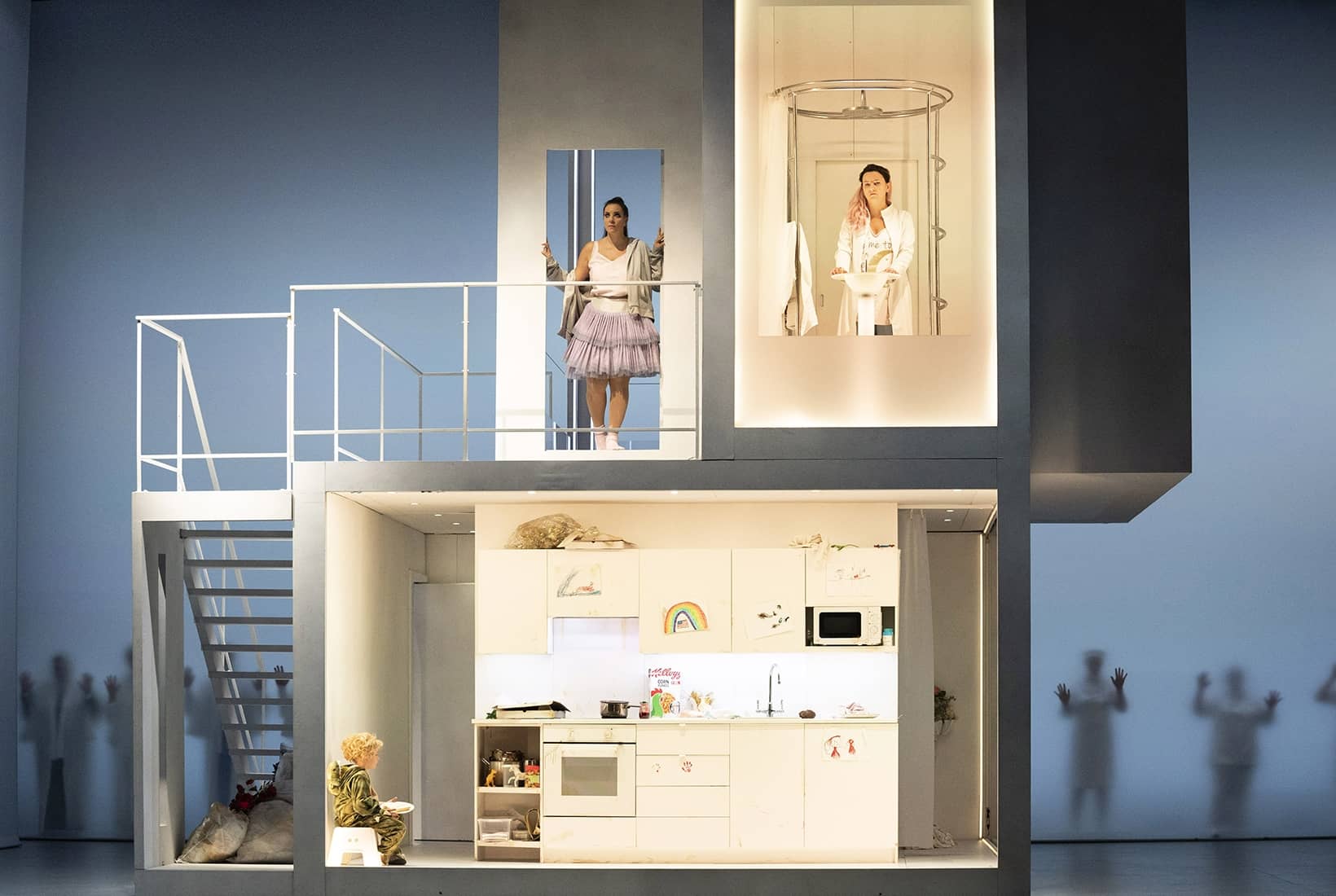‘It’s generally agreed that in contemporary practice, this opera proposes significant ethical and cultural problems,’ says the director Lindy Hume in the programme book for her new production of Madam Butterfly, and if you’ve just shelled out 75 quid in the expectation of attractive scenery and luscious tunes, that’s you told. In truth, it’s rarely advisable to read what a director thinks about their own work, at least until after the show, when it can serve as a bemusing footnote to the evening’s entertainment. Ah, so that’s why they were wearing pink beehive wigs! If a director is any good at their job, it’ll come across on stage without any need for commentary.
Hume’s production is certainly good; in fact it’s very good, at least after the interval. You might have overheard some of the culture war skirmishes that preceded this determinedly non-oriental staging of Puccini’s tragedia giapponese. A great weariness descends; let’s just say that sooner or later Welsh National Opera would have had to replace its washed-out 1970s Butterfly, which at its last appearance in 2017 was probably the single most beige production on the UK stage. And that its successor was always going to have to address the reality that in 2021, apparently, everyone disapproves of Butterfly except the public.
In 2021, apparently, everyone disapproves of Madam Butterfly except the public
So Hume does that opera director thing of teleporting the action into an imaginary world that resembles nothing on Earth. Pinkerton’s love nest is a hard-edged minimalist living pod straight out of Monocle magazine. Staff in white overalls pad silently about, removing the dirty laundry; the men are totalitarian spa attendants and the women are mini-skirted retro-dollybirds (hence the pink beehives). The coolly choreographed rituals of Act One look as bizarre as you’d expect, though sudden, fantastical video effects (by Ash J. Woodward) soften the edges a bit. Then, in Act Two, realism jolts in. Cio-Cio San (Joyce El-Khoury) is now a delusional but devoted single mum, Suzuki (Anna Harvey) is frazzled, and little Sorrow crayons all over the pristine white walls.
Everything seemed to snap into focus here, and if you’re going to present Butterfly as contemporary social realism, it’s hard to imagine it done more powerfully — or acted with more subtlety and conviction. El-Khoury’s singing — as light and tender as blossom in the more intimate moments — took on a fierce, metallic edge as her fantasies outpaced reality, while Harvey was sometimes forceful, sometimes flustered as Suzuki’s devotion started to fray. Leonardo Caimi was a cocksure, slapdash Pinkerton; a deeply shallow man, impervious to the increasingly frantic appeals to basic decency of Mark Stone’s Sharpless. Stone’s plain-singing, head-in-hands sincerity, along with Tom Randle’s sleazy but plausible Goro, helped locate the production’s moral centre. In Hume’s Butterfly, no one culture has a monopoly on virtue — or cynicism.
Hume isn’t afraid to press the emotional buttons either. Snipe all you like at Puccini’s ‘manipulative’ score but plenty of handkerchiefs will surely have had a workout when Sorrow added his toy dinosaur to Butterfly’s flower arrangement. The orchestra helped; Carlo Rizzi can conduct this repertoire in his sleep, but barring a couple of uncontrolled surges, it sounded as though he was discovering it afresh. And it’s saying something when a denouement as familiar as that of Madam Butterfly regains the power to shock. No spoilers, but El-Khoury’s intensity here was chilling, and the final minutes were as swift, inexorable and brutal as anything on stage or screen. This might not be the Butterfly you expect, but it hits you where it hurts.
The London Philharmonic Orchestra launched its season with a concert performance of Michael Tippett’s The Midsummer Marriage — a flamboyant statement of intent from Edward Gardner, in his first concert as the Orchestra’s principal conductor. What a teeming, superabundant piece this is; played by the LPO with vaulting energy and featuring rapturous singing from a cast that included Rachel Nicholls as Jenifer, Robert Murray as her fiancé Mark, and — most brilliant of all — Jennifer France as Tippett’s female Papageno, Bella.
Ashley Riches was a sonorous, malevolent presence as King Fisher, and if the symbolism of his character’s name sounds a bit on-the-nose, it’s nothing compared to the rest of Tippett’s self-penned scenario, which wrestles T.S. Eliot, Arthurian myth and The Golden Bough into a sort of post-Jungian masque, with much of the plot being enacted through dance. Cue massed tutting from music critics baffled by the supposed failings of Tippett’s libretto. In practice, the argument came across perfectly clearly, at least while it was merely a question of words and music. In the absence of scenery or dancers we experienced perhaps two-thirds of the drama that Tippett conceived, though the participation of the chorus of English National Opera hinted at future possibilities. Come on, ENO: if you can do Birtwistle you can certainly manage Tippett. Let’s have it, and soon.







Comments